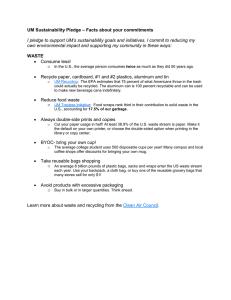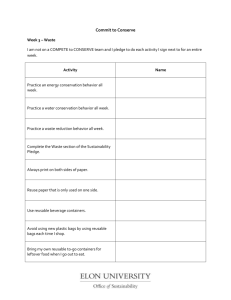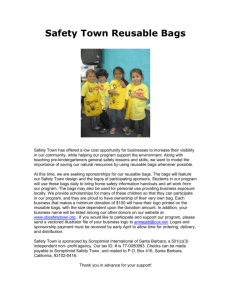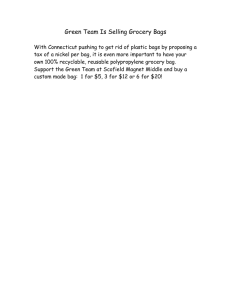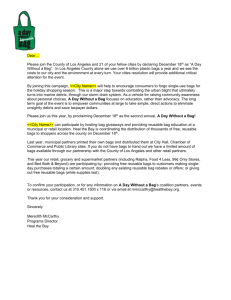All Washed Up – Those Reusable Cloth Bags
advertisement
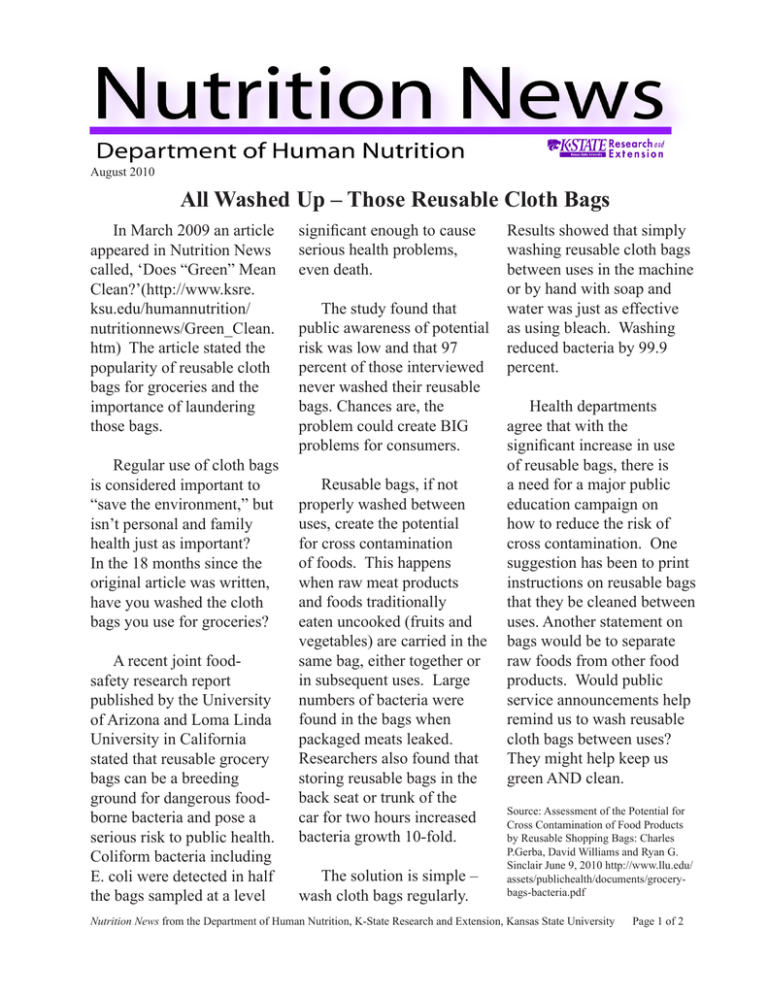
August 2010 All Washed Up – Those Reusable Cloth Bags In March 2009 an article appeared in Nutrition News called, ‘Does “Green” Mean Clean?’(http://www.ksre. ksu.edu/humannutrition/ nutritionnews/Green_Clean. htm) The article stated the popularity of reusable cloth bags for groceries and the importance of laundering those bags. Regular use of cloth bags is considered important to “save the environment,” but isn’t personal and family health just as important? In the 18 months since the original article was written, have you washed the cloth bags you use for groceries? A recent joint foodsafety research report published by the University of Arizona and Loma Linda University in California stated that reusable grocery bags can be a breeding ground for dangerous foodborne bacteria and pose a serious risk to public health. Coliform bacteria including E. coli were detected in half the bags sampled at a level significant enough to cause serious health problems, even death. The study found that public awareness of potential risk was low and that 97 percent of those interviewed never washed their reusable bags. Chances are, the problem could create BIG problems for consumers. Reusable bags, if not properly washed between uses, create the potential for cross contamination of foods. This happens when raw meat products and foods traditionally eaten uncooked (fruits and vegetables) are carried in the same bag, either together or in subsequent uses. Large numbers of bacteria were found in the bags when packaged meats leaked. Researchers also found that storing reusable bags in the back seat or trunk of the car for two hours increased bacteria growth 10-fold. The solution is simple – wash cloth bags regularly. Results showed that simply washing reusable cloth bags between uses in the machine or by hand with soap and water was just as effective as using bleach. Washing reduced bacteria by 99.9 percent. Health departments agree that with the significant increase in use of reusable bags, there is a need for a major public education campaign on how to reduce the risk of cross contamination. One suggestion has been to print instructions on reusable bags that they be cleaned between uses. Another statement on bags would be to separate raw foods from other food products. Would public service announcements help remind us to wash reusable cloth bags between uses? They might help keep us green AND clean. Source: Assessment of the Potential for Cross Contamination of Food Products by Reusable Shopping Bags: Charles P.Gerba, David Williams and Ryan G. Sinclair June 9, 2010 http://www.llu.edu/ assets/publichealth/documents/grocerybags-bacteria.pdf Nutrition News from the Department of Human Nutrition, K-State Research and Extension, Kansas State University Page 1 of 2 Nutrition News from the Department of Human Nutrition, K-State Research and Extension, Kansas State University Page 2 of 2 For more information about healthy eating, contact your local extension office. The Food Assistance Program can help people of all ages with low income buy nutritious foods for a better diet. To find out more, call toll-free 1-888-369-4777. Contents of this publication may be freely reproduced for educational purposes. All other rights reserved. In each case, credit Kathy Walsten, BS, Nutrition Educator, Family Nutrition Program, Department of Human Nutrition; Kansas State University; All Washed Up – Those Reusable Cloth Bags, August 2010. K-State Research and Extension is a short name for the Kansas State University Agricultural Experiment Station and Cooperative Extension Service, a program designed to generate and distribute useful knowledge for the well-being of Kansans. Supported by county, state, federal and private funds, the program has county Extension offices, experiment fields, area Extension offices and regional research centers statewide. Its headquarters is on the K-State campus, Manhattan. Brand names appearing in this publication are for product identification purposes only. No endorsement is intended, nor is criticism implied of similar products not mentioned. Kansas State University Agricultural Experiment Station and Cooperative Extension Service, Manhattan, Kansas. Kansas State University is an equal opportunity provider and employer. Kansas State University, County Extension Councils, Extension Districts, and the U.S. Department of Agriculture cooperating.
